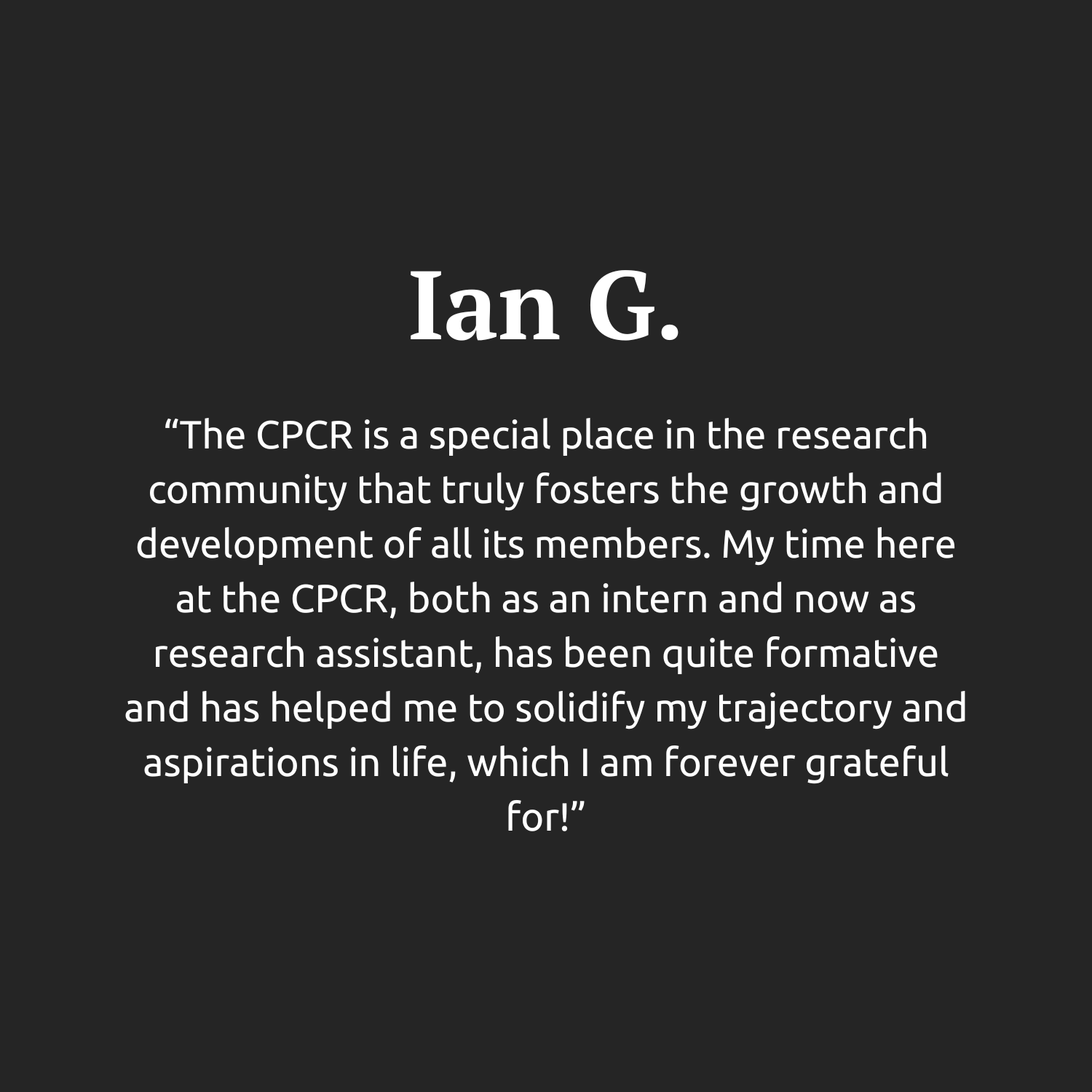Student Internships
The Center for Psychedelic and Consciousness Research (CPCR)’s Student Internship Program is designed to provide direct experience in psychedelic science and human research studies to interested undergraduate and graduate students. Many students receive skills they use towards graduate program applications, summer internships, employment, and networking in the field. Student interns will have the opportunity with a world-leading site in the science of psychedelic drugs and their treatment, and often assist with data collection, data management, participant recruitment, and various administrative tasks.
Update: As of 2022, we only accept applications from currently enrolled Johns Hopkins University students.
Major Research Themes of the CPCR
Answering the most important questions in psychedelic research, therapy, and clinical education, and broadening the field of psychedelic science in collaboration with the best multi-disciplinary scientists in the world.
Conducting rigorous clinical trials that adhere to the highest ethical standards while elucidating underlying mechanisms driving psychedelic effects and therapeutic efficacy.
Providing evidence-based education to clinicians and the broader community to contribute to the development of innovative therapeutic approaches that benefit individuals and society.
Application FAQs
What Research Teams Can I Join?
At the CPCR, we have several principal investigators (PIs) conducting a wide range of studies. Applicants will be asked to specify if they prefer a particular lab in the application survey but are not required to provide a preference.
Frederick S. Barrett, Ph.D.
Dr. Barrett has been conducting psychedelic research at Johns Hopkins University since 2013, and his research in heathy participants and in patients with mood and substance use disorders focuses on the psychological and neurological mechanisms underlying the enduring therapeutic and other effects of psychedelic drugs. He is currently leading a clinical trial to investigate the use of psilocybin to treat patients with major depressive disorder and co-occurring alcohol use disorder, and he is leading a number of ongoing studies aimed at better understanding the psychological, biological, and neural mechanisms underlying therapeutic efficacy of psychedelic drugs.
Albert Garcia-Romeu, Ph.D.
Dr. Garcia-Romeu is an Associate Professor of Psychiatry and Behavioral Sciences at the Johns Hopkins University School of Medicine. His research examines the effects of psychedelics in humans, with a focus on psilocybin as an aid in the treatment of addiction. His current research interests include clinical applications of psychedelics, real-world drug use patterns, diversity in science, and the role of spirituality in mental health, including clinical trials of psilocybin as a treatment for patients with Alzheimer's disease and post-treatment Lyme disease.
Sandeep Nayak, Ph.D.
Dr. Nayak is an Assistant Professor of Psychiatry and Behavioral Sciences at the Johns Hopkins University School of Medicine and is also the CPCR’s Medical Director. Dr. Nayak is primarily focused on investigating psychedelics as treatments for psychiatric conditions, particularly substance use disorders and mood disorders, including clinical trials for patients with opioid use disorder and post-traumatic stress disorder.
David Yaden, Ph.D.
Dr. Yaden is an Assistant Professor of Psychiatry and Behavioral Sciences at the Johns Hopkins University School of Medicine who studies the measurement and experimental manipulation of mental states called altered states of consciousness. He has authored over 40 scientific and scholarly publications and edited two books that provide a scientific perspective on practices and experiences traditionally associated with religion/spirituality. His research is currently focused on the therapeutic potential of psychedelic substances for mood and substance use disorders, including obsessive-compulsive disorder and chronic lower-back pain.
Ceyda Sayalı, Ph.D.
Dr. Sayali is an instructor in psychiatry and a cognitive neuroscientist focused on exploring the neurocognitive mechanisms underlying both the immediate and prolonged effects of psychedelics on clinically healthy individuals and those with medical conditions. Her research uses functional Magnetic Resonance Imaging (fMRI) and Electroencephalography (EEG) for neuroimaging, along with Transcranial Magnetic Stimulation (TMS) to investigate causal hypotheses of brain function. Ceyda's work primarily employs cognitive control frameworks to examine and conceptualize the immediate and enduring impacts of psychedelics on cognitive functions and mood.
Brandon Weiss, Ph.D.
Dr. Weiss is a Clinical Psychologist exploring the psychological and physiological ways in which classic psychedelics produce new learning and therapeutic change. At Johns Hopkins, Brandon is engaged in performing rigorous clinical trials to assess the safety and efficacy of Psilocybin Therapy for PTSD and other disorders. He is also an active observational researcher of ceremonial Ayahuasca, Ibogaine, and other plant medicines.
Nathan Sepeda
Nathan is the Director of Data & Analytics for the Center for Psychedelic & Consciousness Research (CPCR). He oversees data management across all CPCR studies and is directly responsible for designing and maintaining the center’s data infrastructure. Nathan implements secure data storage solutions and develops automated analysis pipelines that support the center’s research operations from data collection through reporting.
What Experience Will I Gain?
BPRU interns are matched with research teams during the interview process in an attempt to align the interests, experience, and educational pursuits of the applicant with the availability and needs of the various ongoing studies. Interns can witness, assist, and learn the various steps of running a clinical trial that promote its success, including ground-up design, data collection, direct participant interaction, and data management. Many of our studies are active over many years, so day-to-day duties are largely determined by the stage a study is in at the time of joining. Intern responsibilities may include but are not limited to recruiting and scheduling participants; collecting, transcribing, and analyzing data; preparing study materials; and conducting study sessions.
Am I Eligible to Apply?
Current Johns Hopkins students who have an interest in clinical research (particularly in psychiatric disorders, medicine, psychology, public health, cognitive science, neuroscience, or related fields), and who have the following are strongly encouraged to apply:
• Self-motivated and internally driven
• Strong interpersonal and communication skills
• Competence and professionalism in interacting with study staff and participants
• Excellent teamwork and problem-solving skills
• Demonstrated interest and passion in academic research involving behavioral pharmacology and/or related fields
When Do Internships Start?
The CPCR student internship program is designed around the academic schedule of its applicants and accepts applications on a rolling basis as needed by the study teams. Successful applicants should be able to dedicate a minimum of 10-15 hours a week to being both remote and on-site at the CPCR during business hours.
Are CPCR Internships Paid?
The CPCR currently has both paid and for-credit positions available. Paid positions are available on a study-need basis and depend on the study budget. These positions typically require a larger time commitment weekly. If you are looking for a for-credit position, please contact your department and the registrar's office for specific enrollment deadlines.
Student Experiences



How to Apply
Application to the CPCR Student Internship Program
If you are interested in our Student Internship Program, please fill out our application. Prospective applicants are highly encouraged to review this website, which is specifically designed to answer common questions. If there are specific questions that are not addressed, please contact us via email (cpcr-sipcommittee@lists.johnshopkins.edu).
Important: In the spirit of equity, please hold off emailing Principal Investigators before hearing back from CPCR SIP.


